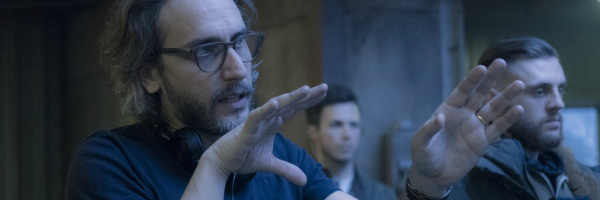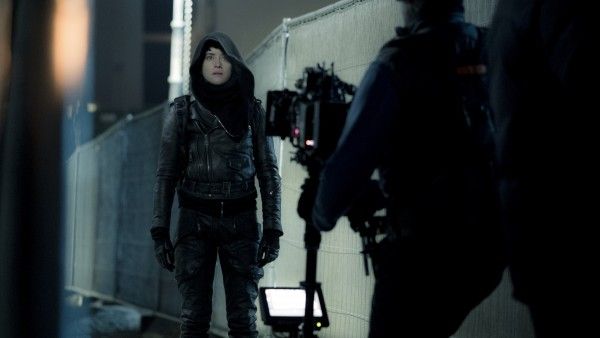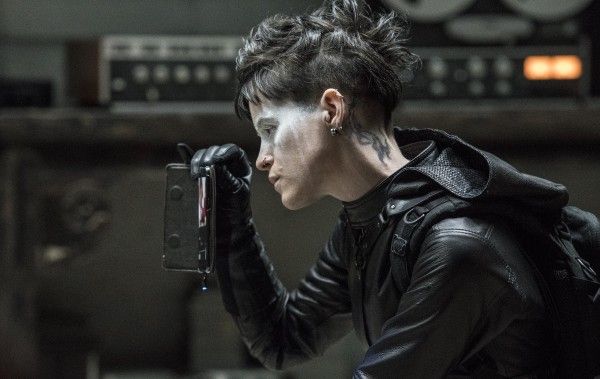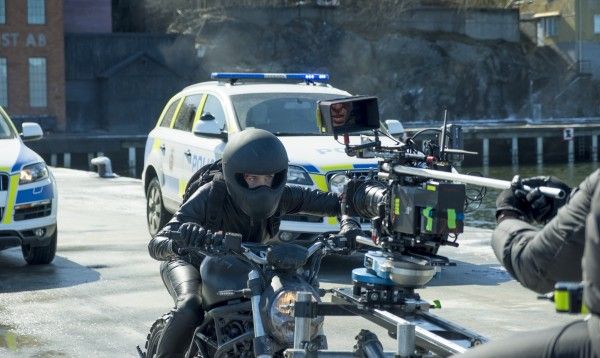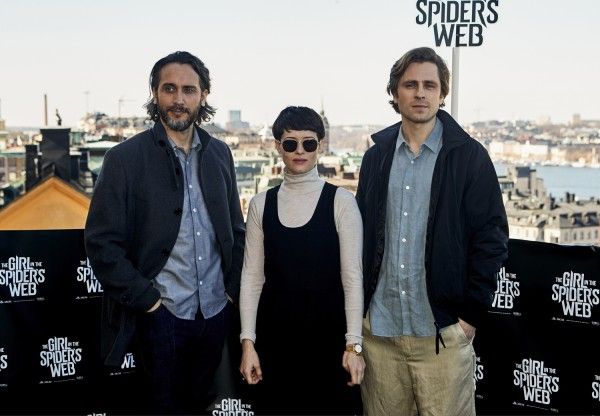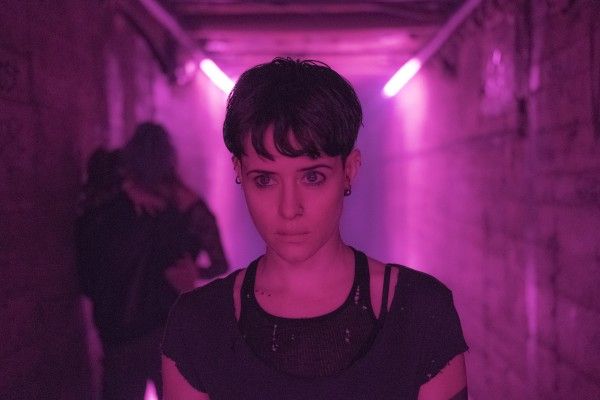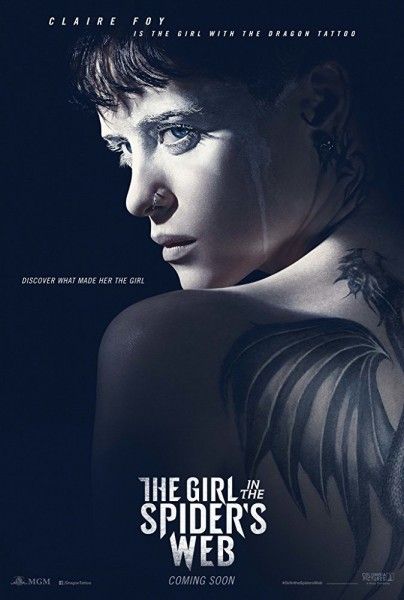Punk hacker and modern literary icon Lisbeth Salander is headed to the big screen once again in The Girl in the Spider's Web. With the beloved Swedish film trilogy and David Fincher's 2011 The Girl with the Dragon Tattoo adaptation behind us, Sony Pictures turned to Don't Breathe director Fede Alvarez to breathe new life into the franchise based on Stieg Larsson's bestselling Millennium book series.
Recruiting Golden Globe-winning The Crown breakout Claire Foy to take on the role of Salander, Alvarez looked to the fourth book, David Lagercrantz's The Girl in the Spider's Web (Lagercrantz took over writing the series after Larsson's death) for the next chapter in Salander's journey -- one that puts the character front and center. Never before brought to screen, The Girl in the Spider's Web offers the perfect tale of trauma, conspiracy and vigilantism to reinvent the franchise with Alvarez's signature chilling style.
Back in March, I had the opportunity to visit the set of The Girl in the Spider's Web in Berlin, Germany, where we watched Foy suit up and go full Salander and spoke with Alvarez during a break in production. Often, when you visit a set, you don't get time with the director. It's understandable -- they're just a little busy -- but we got nearly twenty minutes with Alvarez and the filmmaker had plenty to say about his vision for the film and how he's bringing his own touch to the hit book series. While Alvarez was reluctant to discuss the plot of the film (especially anything to do with Camilla -- Lisbeth's mysterious sister -- secrets, secrets!), he talked at length about putting his visual stamp on the material, how his script integrates book two and three, why he doesn't quite consider Lisbeth a vigilante superhero, working with Foy on a new iteration of the iconic character, and a lot more. Check out what he had to say below.
I was curious about the mixed formats and what you're chosing.
FEDE ALVAREZ: It's not really a mixed format. We're shooting on Alexa 65, which is like the digital version of a bigger format. We have standard Alexas but most of what you see, that's Alexa 65, which is kind of a gorgeous format. But I think it's really a matter of taste. Most of the audience doesn't really care about Alexas, and this technical stuff, but for me and Pedro, the DP, it was just exciting to be shooting with this camera.
What are you using to evoke the visual palette? It does seem to create the sense of tension and also the horror elements that you're known for.
ALVAREZ: Pedro is the same DP, we worked on Don't Breathe together, we're friends since we were 20, 21 years old, and we've been working together ever since. It's all in the light, really. I mean, obviously production design is an important job and we're trying to keep the colors under control, but a lot is in the light, and also where the camera is... it has a lot of elements of a horror movie. It is a very scary thriller, if you want, just because that's kind of what I'm interested in [laugh]. I'm on my third movie, and that's the time when suddenly as a director you kind of look back a little bit, and look at the themes you repeat over and over - because I've been a writer on all my movies - it becomes evident. You go like, "Well, you obviously have an issue with this or that because you go back there all the time."
I definitely have an issue with guilt, all my stories are about guilt. And at the same time, I'm obsessed with this idea that we all have this idea of a door, that there's something horrible beyond that door that we would rather not go through it. We know it's there, we look at it all the time, there's something dreadful on the other side, you never know when you're going to have go there. So some movies, more optimistic movies, say if you open that door it's not going to be as bad as you think. My movies on the other hand... [laughs] They say what's on the other side is way worse than what you imagine, but it says that if you go through that, and you face that, then what's beyond that will always be for a better life. So that's a constant theme of all of my movies and you've seen that here as well. So it definitely has a tone, that there's a little bit of dread that something bad is coming in the story, that's what you see Lisbeth going through, since the beginning, she's gonna go through that door and she's going to face that dread.
We have been hearing a lot today about how Salander is like a superhero, a vigilante, like Robin Hood. Now we saw her with the "mask". Are you trying to create a more kind of superhero-ish movie hero with this character?
ALVAREZ: First of all, I obviously didn't create her, it obviously comes from the books, but in the books she does quite amazing stuff, and you could say she's a superhero. I would never really personally use that term with her, because I think it's the approach to the character. So, in a particular scene she does something that will be more in that world... it is definitely more vigilante, if you want. We don't see a lot of that aspect of her. I mean, we see it at the beginning with the intro of who she is... This movie is in a way more about the girl behind that. It's like if you were watching a movie that's all about Bruce Wayne, in a way. You get to see Batman in the first minutes, but you'll never see him again, because I'm more interested in that aspect of her. So yes, there's definitely an aspect of a superhero, but usually, me as an artist, I'm sure you too, you connect way more with the human being behind and who is that person, what sort of life are they living. And she's a very obviously fascinating character, and a very complex one, and one that, you know, she doesn't want you to like her, she doesn't care about if you like her or not, she acts in that way. So it's different from most heroes, that are looking for some sort of approval or they are more socialized. She's none of those things, and that's part of what fascinated me about her. So yeah, I wouldn't call her a superhero. Definitely for sure she does some things... the mask is more like a war paint, it's really something to intimidate. For people who are familiar with her, everybody has a different idea of who she is, that's part of the fun of working with this character.
Is the movie more centered around Lisbeth and not so much about Blomkvist?
ALVAREZ: For sure, yeah. I mean, he's definitely in the movie, he has a big part in the movie, but it's the difference between... particularly the last American film, like, this one is all about her. It starts with her and ends with her.
When we spoke with Claes [Bang] he suggested that the movie isn't entirely like the book, it might be pretty different. Can you talk about what was your approach to seeing the book, wanting to do something with that, and then turning it into a Fede Alvarez story.
ALVAREZ: When I was writing a friend of mine asked me that question, like, "How is this a Fede Alvarez movie?" and I was like, "I don't know, because I made it." [Laughs] You never think about yourself as "What's my style, what's my..." -Personally I don't, I just do, and if I've done it myself there's probably going to be something that has my identity in it. Particularly because I don't do jobs, I just go for the ones I really believe in and that's it.
So there was the story in the book that I connected with, but there was a lot of freedom to interpret that and tell my own story. It's something that I wanted to do because they never made the second or third book, and I think there's a lot of elements of Lisbeth that you get to learn a lot more about her and her life and her father in the second or third. Our approach with Jay Basu, my co-writer on this, was like, let's base the storyline on the main events that happen in the fourth book, but let's take some of the emotional journeys that she goes through, and even kind of the structure of the plot, the things that happen in two and three. For people who are familiar with the books, they'll see little moments, they'll be like, "That's straight out of the second book, and that moment is more based on the third book. " So there's little windows of those books as well. In a way it's based on two three and four, in a way, but obviously all the characters and all that come from the fourth book.
What was it about the book that hooked you and connected you to the story?
ALVAREZ: I think it's her. It's Lisbeth, more than anything. Her character is just unique. There's nothing like her, particularly in an industry obsessed about "You have to have a likeable main character!" - something like that. "We have to like her, how do we like her?" And again, everything she does is to push you away and make you not like her. So that's what I love about it... You're allowed to create this story that puts a character at its center that's not what you are used to.
It does sound like there's been kind of a shift in balance, because the book is very Blomkvist-heavy, so have a lot of the Blomkvist elements been dropped for the movie?
ALVAREZ: No, you see most of the stuff he does. Again, a book is a book and a movie is a movie. I think certain books are sacred, I think, when you do an adaptation you have to make sure you don't betray any element of the book because then the fans will murder you. I wouldn't have done that if it was such a book. I think more what everybody agreed on was, let's embrace the universe and let's base on that story, but let's make sure that above all things it's a great film. Because if there's anything in the film that suddenly I'm doing and I don't like, and the audience is like "I didn't like that part." "I'm sorry, it's in the book." They don't care. The audience just wants a great film. And the author was onboard with our story and it was more like really we adapted that story to the film world. Because again, for me, the thing that matters the most is when you see the audience through the story and they have a great experience. I have to put that in front before honoring any particular detail of the novel. The novel's one thing, the film is a completely different format.
You talked about the idea of opening a door. That's often, metaphorically, just a door in our minds to our past or a part of ourselves. In this it's like that thing is coming out physically, in the form of her past and her sister. Can you talk about their relationship and how that's playing out?
ALVAREZ: It's hard to talk about that without spoiling the whole movie. But there is definitely, actually something very interesting about this particular book. I think in all the books, in the first three, there's references to Camilla, and she's named. I think in the first book they name her twice, they never really go there until this one. That to me was fascinating as well, like, who is her sister, what is their relationship, how do they get along... All elements of something I was very intrigued about, and here in the movie you'll get an answer to that, but anything I could tell you would spoil it. You do open the movie with an episode of their childhood...
Oh yeah, we saw a flashback scene.
ALVAREZ: Yeah, you get to see Lisbeth and Camilla as kids at the beginning. You get to see their father and there's a quite dark episode of their childhood that kind of defined who they are. So in a way, probably in the first fifteen minutes of the movie, you really get behind her skin to understand how she becomes the girl with the dragon tattoo. It really shows you kind of a window to her psyche. You'll see it, in the first scene, you'll know what I'm talking about. Everything that created who she is as an adult happened on that episode.
What is your collaborative relationship like with Claire [Foy] - finding this character, your guys' iteration of Lisbeth.
ALVAREZ: I think it's always an ongoing process, and usually you have the conversations before we cast, so when I was just meeting her for the first time, and that point is when you realize you connect with the actor and have a similar approach. This one is definitely not about the get-up and the piercings and all that, we just kind of left that aside and it made it way simpler. She's not the 24-year-old Lisbeth of the first book anymore, so I was interested in what's the more mature Lisbeth, the one that is not so much about the club and the piercings in her face and all that. I didn't want that to define her. I didn't want that to be something where, as soon as you see her you have all this look, I didn't want to make it about that. And for [Foy] it was the same, it was just like, let's make it simpler. So you get to see her here, with that [points to monitors with Foy in vigilante get-up] but in the next scene she washes her face and she has nothing on her face, it's just a girl. So on that we really connected, and when you start in a good place then the creative process is way more exciting. It's usually problem if you start in places where you don't look eye-to-eye. That's when it's a mess.
It's been a lot of fun, and she's a fantastic actress, it really blows my mind every day. You sit there and you ask for something, and you're looking at the monitor and you can't believe it. For me the best actors, for the big screen, are the ones that when you're standing there and you look directly at what's happening, you think nothing has happened. You go, "Did she do that thing?" And then you go and you look at the monitor, and of course that's going to be on a massive screen where one eye becomes the size of a person. Even when they're not doing anything you see what's happening in her eyes and you see what she's thinking, what she's feeling, what she wants to say - every emotion she's repressing, you see it there. That's something that you don't do in theater because you don't see that, and in TV the screen is too small, but it's perfect for the movies, and that's what I've always been interested in. So you'll see, I think she'll blow everybody away because it's such a nuanced performance with a character that is all about her inner life, and she's trying to hide every emotion she has from everybody because she doesn't like people [laughs]. But it's been amazing for me.
Can you talk a bit about Lakeith's character, Ed? Has he been changed a lot from the book, or is he still... he's quite high-strung in the book.
ALVAREZ: Oh yeah, yeah. He has changed a lot from the book, for sure [laughs]. Different age, different race, different everything. But it's still faithful to the spirit that he's this NSA agent that is very arrogant, but cool in his own way, and Lakeith is crushing it. He's one of those guys where you're having so much fun, and you cannot have enough of it. Like, you're watching him... it's just fun to watch. Every scene he's in, he's such a powerful energy. And also the take on the character, what he created is something unique, and something actually that exists in the states, it's this new generation of people that go from CIA to NSA and back to CIA and live in that world, and they're computer nerds but also they have field experience. Because, you know, back in World War II you needed mechanics, engineers and people that used to work in a car shop and went to war, and now it's a lot more of the computer people that used to just be nerdy on a computer or a hacker, and then need them in the field. So it's kind of this new breed of young NSA agents that we've been doing research on and [Lakeith has] created stuff with that. And I think you haven't seen a character like that, because you think you know what he is at the beginning when you meet him for the first time, but then during the whole movie you get to know him more ad you realize you have no idea. He's just such a talented actor, and a lot of fun to work with.
Can you talk at all about the relationship between Lisbeth and August, and how that's translated from the book?
ALVAREZ: That's one of the things I think we've been more faithful to, because it starts in a place where, as a premise for her story... suddenly she's stuck in a situation where she has to suddenly be responsible for and take care of this kid for a minute, and she's not really good with kids [laughs]. At all. She doesn't want to be. And he's special in his own way, so seeing them together - last week we were shooting some of that scene and both of them are very awkward, and they're trying to connect somehow but it's very difficult. Actually, you get to see a lot more here than what you get in the book, because in the book you always kind of see it through the flashback of someone saw them together, running from here to there. And here you really get to spend more time with them and see how they're trying to connect, and how she's trying to not be terrible, but she's terrible, it's a lot of fun to watch [laughs]. Being really, really bad with kids! But then eventually they'll find things that they have in common, and they have a lot more than what they think. But if I say more I'll spoil it.
Do we see August's drawings, from the book? Is that a big plot element?
ALVAREZ: Yes, there's different kinds of drawings, though, but he is some sort of artist here. We'll see... I think you'll like what we did with it.
Those characters [Lisbeth and August], they'd be similar in a lot of ways because they both have a desire, somewhere, to connect.
ALVAREZ: For sure, but that's what's good about these characters, like, in movies your main characters always are, particularly in horror movies, they're always pretty much in touch with their emotions, and they're good public speakers and they have all these qualities, right? They're very charming and they talk a lot and the good thing with Lisbeth is she's none of those things. So you put her in a situation where she has to connect with this kid - and the kid is also not the classic snappy, joyful kid from movies [laughs] he's the total opposite of that. So seeing the two of them together is what makes it fun, but you'll see that they have a similar soul, and they recognize each other as soon as they see themselves for the first time.
We are here in this studio that has so much history, so how is it for you to be working here?
ALVAREZ: It's amazing! Just amazing. I mean, apart from obviously, buildings are buildings, it is kind of film sacred ground. The local crews are amazing. That's what you want when you're shooting, because if the studio's amazing but the crews are shit, there's no history that will make it fun. You will be frustrated all day. But the people we've got here are really the best in the area. But also it's like, every time I walk in the office there's a bunch of chairs of famous directors that worked here. It has that charm of an old-school film studio. When you drive in every day and that's your day at the office, it's a pretty good feeling.

